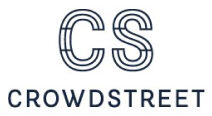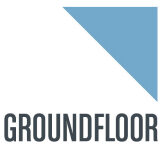A Closer Look at the Best Real Estate Crowdfunding Sites
Here's an in-depth analysis of our favorite real estate crowdfunding platforms...

Our #1 Pick for Experienced Investors
Crowdstreet
| Feature | Details |
| Fees | Individual projects - Varies by sponsor Crowdstreet funds - Varies by fund (0.5% - 2% on average |
| Minimum Investment | Varies by deal, usually around $25,000 |
| Annual Returns (average) | 12.6% - 20% |
| Investment Options | 4 portfolio options with various eREITs and eFunds |
| Accredited Investor Status Required? | Yes |
Crowdstreet was founded in 2014 as a way to offer accredited investors access to quality commercial real estate projects.
With over $1.5 billion invested and over 470 projects funded to date, they have grown to become one of the largest and highest-quality crowdfunded real estate platforms in the US.
Crowdstreet is open to accredited investors only, with a net worth requirement of $1 million (excluding your primary residence), or annual salary of $200,000 or more. Some projects and funds may have higher net worth and salary requirements.
Crowdstreet offers access to individual projects, as well as funds that are similar to a mutual fund, with exposure to a basket of real estate projects.
Pros
-
Large selection of projects available
-
Well-designed platform for investors
-
Stringent approval process leads to high-quality projects
-
Higher-than-average returns for accredited investors
Cons
-
Highly illiquid investments
-
Available to accredited investors only
-
High minimum investment of $25,000 for most offerings
Crowdstreet is hands down our #1 overall choice for accredited investors. In fact, our company founder, Paul Tracy, personally invests in the Crowdstreet platform and can't stop raving about it. For more details, please read our Crowdstreet review here.

Best for Beginner Investors
Fundrise
| Feature | Details |
| Fees | 1% total (0.15% advisory fee, 0.85% management fee) |
| Minimum Investment | $1,000 |
| Annual Returns (average) | 9.47% (in 2019) |
| Investment Options | 4 portfolio options with various eREITs and eFunds |
| Accredited Investor Status Required? | No |
Founded in 2012, Fundrise now manages over $1 billion in assets for over 150,000 individual investors. It offers non-tradable REITs which invest in private commercial and residential real estate investment projects.
Fundrise is a crowdfunding real estate site that’s open to all investors. With low minimum investments and a simple-to-use mobile app, Fundrise is a great option for beginners who want to dip their toes into real estate investing.
Pros
-
Low minimum ($1,000) for beginner investors
-
No accredited investor status required
-
Easy to use mobile app
-
IRA offering available
Cons
-
Funds not easily accessible (without penalty)
-
Higher taxes due to non-qualified dividends
-
Additional fees may apply per project
To learn more about our favorite real estate crowdfunding platform for beginner investors, read our Fundrise review here. Otherwise, if you're ready to get started, click the green button below to open an account.

Best for Investing in Individual Single Family Homes
Arrived Homes
| Feature | Details |
| Fees | One-time sourcing fees (varies per property) 1% AUM annual fee |
| Minimum Investment | $100 |
| Annual Returns (average) | 5% - 6% annual dividend Annual real estate market appreciation |
| Investment Options | REIT shares in single-family rental homes |
| Accredited Investor Status Required? | No |
Arrived Homes (known as “Arrived”) is an online real estate investing platform designed to allow investors to purchase shares of equity in single-family homes. Arrived is new on the scene of crowdfunded real estate, but with financial backing from Amazon CEO Jeff Bezos and Salesforce CEO Marc Benioff, it is growing rapidly.
Arrived is open to all investors in the U.S. (18 years old and up), and has a unique structure for its investments. Instead of packaging multiple properties into a standard REIT, all individual homes are structured as stand-alone REITs with a $100 minimum investment, allowing investors to purchase shares in multiple properties for a small investment.
As an equity owner in each property, investors receive quarterly dividends from rental income, as well as a share in property appreciation.
Investors can quickly sign up for a free account on ArrivedHomes.com, and start browsing available investments right away.
Pros
-
Ability to purchase fractional shares in single-family rental homes
-
Very low minimum investment ($100)
-
Transparent fee structure (1% AUM plus sourcing fees)
-
Tenants are shareholders too
Cons
-
REITs not publicly traded (harder to sell shares)
-
Limited number of properties
Arrived Homes is hands-down our favorite real estate crowdfunding platform for investing in single family homes. For more information, read our Arrived Homes review. If you're ready to get started, click below to open an account.
Learn More at ArrivedHomes.com

Best for Tax-Efficient Real Estate Investing
EquityMultiple
| Feature | Details |
| Fees | 1% annual fee (on average). Other fees apply per project. |
| Minimum Investment | As low as $5,000, typically $10,000 |
| Annual Returns (average) | 14.50% |
| Investment Options | 3 portfolio options with various investments including debt, equity, funds, CRE securities, opportunity zones and 1031 exchanges. |
| Accredited Investor Status Required? | Yes |
EquityMultiple is a commercial real estate crowdfunding site that provides accredited investors access to private real estate deals. It offers multiple investment options, including debt, equity, opportunity zones, and even 1031 exchanges. These investments are part of 3 portfolios with different investment goals.
-
Fund Investing - Best for diversification
-
Direct Investing - Best for investing in specific properties
-
Tax-Deferred Investing - Best for tax benefits
EquityMultiple only works with accredited investors ($1 million net worth/$200,000 annual income). Offering a wide range of investment options, the company helps users manage their risk tolerance while giving them direct exposure to commercial real estate. High returns – with monthly and quarterly distributions – are also available.
Pros
-
Wide array of investment options
-
14%+ returns over time
-
Simple-to-use online platform
-
Tax-efficient investments available
Cons
-
Open to accredited investors only
-
High minimum investment
-
Non-liquid investments
EquityMultiple screens out about 95% of the deals it reviews, opting for only the highest-quality investment opportunities. For more details, read our complete EquityMultiple review. If you're ready to get started, click the green button below.
Learn more at EquityMultiple.com

Best for REIT Investing
Streitwise
| Feature | Details |
| Fees | 3% up front fee, 2% annual fee |
| Minimum Investment | $1,000 |
| Annual Returns (average) | 9.57% |
| Investment Options | REIT only |
| Accredited Investor Status Required? | No |
Streitwise is a privately-traded REIT sponsored by Tryperion Partners, which provides investors with access to equity in their real estate investments. It offers a quarterly dividend with an average of over 9% in annualized returns.
Streitwise isn’t a crowdfunding real estate site, but it does offer a REIT fund for investors to participate in. Streitwise does have a 5% first-year fee (plus 2% annual fee), but this is actually lower than the industry average for REIT investments (which is closer to 10%).
Pros
-
High dividend payouts
-
No accredited investor status required
-
IRA offering available
Cons
-
High fees compared to traditional crowdfunding sites
-
Funds locked for a minimum of 1 year
-
Non-qualified dividends
Streitwise is one of the few platforms that offer non-accredited investors access to commercial real estate office buildings. The co-owners also have more than $5 million invested in the company's REIT themselves. Check out our complete Streitwise review for more information. If you're ready to get started, click the green button below.

Best for Automatic Real Estate Investing
RealtyMogul
| Features | Details |
| Fees | Vary by investment |
| Minimum Investment | $5,000 |
| Annual Returns (average) | 4.5% - 8% (REIT) |
| Investment Options | 2 REIT options, private real estate, 1031 exchange |
| Accredited Investor Status Required? | Only required for private real estate investing |
Founded in 2013, RealtyMogul has now served over 200,000 investors with over $600 million currently invested. The company platform offers over $2.80 billion in real estate investments, providing access to a wide array of private real estate and REIT options. It’s known for having an extremely stringent due-diligence process, investing in less than 1% of the projects presented to their team.
RealtyMogul REITs are open to non-accredited investors and provide two options:
-
MOGULREIT I: Income - Holdings include senior debt, mezzanine debt, and equity structures
-
MOGULREIT II: Growth- Holdings include preferred and common equity in apartment buildings.
RealtyMogul offers access to 1031 exchanges for investors who prefer to defer taxes on their real estate investments. The company also provides access to private real estate equity for accredited investors only.
Pros
-
Huge customer base and investment holdings
-
Multiple investment options
-
Automatic investments available on REITs
-
Easy-to-use investing platform
Cons
-
Additional fees can add up quickly (especially in REITs)
-
$5,000 minimum investment
-
Higher taxes due to non-qualified dividends
-
Long lock period for private real estate deals
RealtyMogul provides real estate investment opportunities to both accredited and non-accredited investors on its easy-to-use platform. Check out our full RealtyMogul review to find out more details. If you're ready to get started, click the green button below.

Best for Investing in House Flips
Groundfloor
| Features | Details |
| Fees | No investor fees |
| Minimum Investment | $10 |
| Annual Returns (average) | 10.50% |
| Investment Options | Collateralized debt |
| Accredited Investor Status Required? | No |
Groundfloor is a crowdfunded real estate investment site that allows investors to lend money (e.g., a hard money loan) to borrowers who purchase and flip distressed properties. Investors earn interest on the loan, which is typically paid back within 12 months. These projects are all graded on a risk/reward scale, allowing investors to choose the level of risk they’re most comfortable investing in.
Groundfloor has generated average returns over 10% over the past 6 years and investors are able to choose the property they’ll loan money to. Loans are 12- to 18-month terms, giving investors a quicker return than typical equity real estate investments.
Pros
-
Low minimum $10 for beginner investors
-
No accredited investor status required
-
Short term loans for fast returns
-
No investor fees
Cons
-
Higher default and foreclosure risk
-
Loan updates only available monthly
-
No equity investing options
Investors interested in house flipping can't ignore Groundfloor. You can start with as little as $10 and it's available in all 50 states. For more details, check out our full Groundfloor review. If you're ready to get started, click the green button below.

Best for Multi-Family Real Estate Investments
DiversyFund
| Feature | Details |
| Fees | $0 management fee Acquisition and development fees vary per property |
| Minimum Investment | $500 |
| Annual Returns (average) | Varies |
| Investment Options | Two REITs (Debt and Growth) |
| Accredited Investor Status Required? | Yes |
DiversyFund is an online real estate investing platform that offers non-traded REITs to investors. The only available fund currently is the Growth REIT, which has a $500 minimum and is open to non-accredited investors. This REIT is a non-traded fund, meaning there is no secondary marketplace to sell the shares you own.
DiversyFund invests in multi-family real estate, specifically apartment buildings with large occupancy (100+ units). Investment dividends are reinvested back into the property, which currently has a 5-year value-add lifecycle, after which the properties are sold and returns are distributed to investors.
While DiversyFund offers access to multi-family real estate for a very low minimum, investments are locked up until the disposition of properties, which is currently slated as 2023 at the earliest.
Pros
-
Access to multi-family real estate investments
-
Low minimum investment
Cons
-
Illiquid investment
-
Dividends not distributed to investors
-
Mixed reviews about customer service and leadership team
-
Only one REIT available (Debt REIT on hold)
-
Developer fees may be high
DiversyFund is an excellent choice for investors who want to invest in multi-family properties without the hassle of management fees or sign-up fees. Check out our full DiversyFund review for more details. If you're ready to get started, click the green button below.

Best for Buying and Selling Rental Homes
Roofstock
| Feature | Details |
| Fees | 3% listing fee ($2,500 minimum) 0.5% purchase fee ($500 minimum) |
| Minimum Investment | $5,000 |
| Annual Returns (average) | N/A |
| Investment Options | Purchase property, sell property, institutional services |
| Accredited Investor Status Required? | No |
Roofstock is an online marketplace where investors can buy or sell residential rental properties. It will also be launching Roofstock One, an investing platform where users can purchase equity shares in a property.
Roofstock boasts lower-than-traditional fees for real estate transactions, with a 3% listing fee for selling properties, and only a 0.5% purchase fee for buying a rental property. Compared with a traditional 6% fee for selling a home, this is a significant savings.
Users can quickly sign up for a free account and navigate the marketplace to find a property, place a bid, negotiate the price and terms, and close a sale all online. You don’t need to be an accredited investor to buy or sell real estate with Roofstock.
Pros
-
Access to hundreds of single-family rentals
-
Very low fees to buying and selling rentals
-
Includes insights into property neighborhood, crime level, schools, and employment
-
Additional services available such as seller services and property management
-
IRA investing available
Cons
-
Fractional-share investing paused (relaunching as Roofstock One)
-
Property not available in all states
-
Investments are illiquid
Roofstock is the way to go if you are looking for a way to buy and sell properties remotely. Since its founding, more than $4 billion in single-family residential home transactions have been completed with Roofstock. Check out our full Roofstock review to learn more. If you're ready to get started, click the green button below.

Best for Private Lending Investments
PeerStreet
| Features | Details |
| Fees | 0.25% - 1% fee (varies per property) |
| Minimum Investment | $1,000 |
| Annual Returns (average) | 6% - 9% |
| Investment Options | Residential and commercial debt |
| Accredited Investor Status Required? | Yes |
PeerStreet is a real estate investing platform that gives accredited investors access to private lending investments for residential and commercial real estate. These loans are from partner private lenders and banks, and investors receive a percentage of the monthly interest payments.
PeerStreet offers a simple-to-use online platform, with hundreds of loans to choose from that each come with a detailed overview, investment history, and expected rate of return. Each loan also lists the name of the loan originator, allowing investors to review the bank or lender that holds the loan. Returns are higher than typical loans, with 6% - 9% APR (or more) on most investments. These loans are typically for special projects, such as property rehabilitation, and carry a higher interest rate.
Investors in PeerStreet must be accredited, which means providing evidence of a $200,000 (or more) income over the past two years, or a $1 million net worth, excluding your personal residence.
Pros
-
Access to hundreds of loans from private lenders
-
Higher rate of return than traditional loans
-
Lender and fee transparency
-
FDIC insured holding accounts
Cons
-
Illiquid investment
-
Only available to accredited investors
PeerStreet offers private lending investments for real estate investors, and even offers a self-directed IRA option. For more details, check out our full PeerStreet review. If you're ready to get started, click the green button below.
The Basics: What Is Real Estate Crowdfunding?
Real estate crowdfunding is a way to invest in commercial real estate without needing to purchase or manage property. Crowdfunding sites connect real estate developers and professionals with investors who want to fund these projects for a percentage of the profits.
While some sites are reserved for accredited investors, many have no requirements and allow individuals to invest using their platform. The invested funds are used for the purpose of purchasing, improving, and developing commercial real estate projects.
Equity investments may include private individual real estate, multi-family homes, or large commercial projects. The funds can also be used to lend to real estate borrowers, or participate in 1031 exchange deals for tax deferral purposes.
How Does Real Estate Crowdfunding Work?
Real estate crowdfunding sources capital for real estate projects, allowing individuals to invest small amounts into a real estate project in return for a portion of the profit. Crowdfunding platforms act as the intermediary between the investors and the project owners, charging a fee for their services.
There are typically two types of investment options:
-
Equity - Shares of ownership in the real estate project, offering investors a share of the profits
-
Debt - Funds borrowed by the project owners (with interest paid to investors)
While traditionally reserved for accredited investors, many crowdfunding sites now offer investment options for non-accredited investors, too.
Real Estate Crowdfunding vs. REITs
A real estate investment trust (REIT) is a company which invests in income-producing real estate. REIT shares are tradable securities that give investors ownership in the company. To keep their status as a trust, REITs are required to distribute 90% of their profits back to shareholders in the form of dividends.
There are typically no minimum investment requirements or lock-up period for publicly-traded REITs.
Real estate crowdfunding is similar in that it allows individual investors to fund real estate projects, but the investments are pooled together by a sponsor and distributed to the participating projects. This gives investors direct ownership in private real estate projects.
Crowdfunding has traditionally only been available to accredited investors, but many new options have become open to all investors. These investments are considered “illiquid” with lockup periods as long as 7 years on some projects.
Pros of Real Estate Crowdfunding
-
Potential for high annual returns (12% or more)
-
Transparency as to project details and updates
-
Asset diversification for your investment portfolio
-
Monthly or quarterly distributions
Cons of Real Estate Crowdfunding
-
May earn more by directly investing in real estate ownership
-
Illiquid investment, sometimes locked for years
-
High execution risk
-
High minimum investment ($10,000+) on some projects
Is Real Estate Crowdfunding Worth The Risk?
Investing in real estate crowdfunding does carry significant risks, but it can also be extremely lucrative. The value depends on your investing strategy, overall portfolio mix, risk tolerance, and other factors.
If you’re an accredited investor with extra funds to invest in longer-term projects, crowdfunding might be a great option. It can provide annualized returns in excess of 12% and help you diversify your overall portfolio, as well as provide passive income.
For example, investing in an apartment complex real estate project may have a 5-year lockup period, but could provide you with higher returns, as well as monthly dividends from rent collection.
On the other hand, investing in crowdfunded real estate carries major risks, including economic downturn or market supply change (that could reduce your returns). Many crowdfunded real estate investments lock up your investment funds for years at a time.
For example, if you invest in an apartment complex project that’s looking to improve the facilities and increase rents – but the economy goes south – you may be stuck with low, underperforming rents while your funds are locked into the project for years.
How to Get Started With Crowdfunding Investments
If you’re looking to invest in real estate crowdfunding, here’s how to get started.
Find a Reputable Real Estate Crowdfunding Company
Always look for a company that’s been in the industry for at least 5 years and has access to qualify projects. Review its historical returns and how much it has paid out in dividends to date.
Find the Right Investment
Do you want passive income, or do you want to invest in a long-term project with a large payout at the end? Do you need your funds accessible? What amount can you invest? Make sure you understand your investment options before choosing any investment.
Most crowdfunding companies have multiple options to choose from, so find one that aligns with your goals before investing anything.
Understand the Fine Print
Crowdfunding can be a complex investment, so understanding the details of the investment are key. Learning about fees, distributions schedules, project timelines, and other factors can help you avoid any surprises down the road.
Collect (or Reinvest) Distributions
If you choose to invest in a project that pays out distributions, many companies let you choose to deposit those into your bank account or reinvest them into the project. If you’re looking for usable income, you can collect those distributions. But if you want to maximize your returns, opt to reinvest them back into the project.
Pay Your Taxes
One of the downsides to crowdfunded real estate investments is that distributions are typically non-qualified, meaning they’re taxed at your ordinary income rate. If you reinvest these distributions, you might receive a surprise tax bill at the end of the year.
We recommend meeting with a certified tax professional to understand how these investments can affect your personal taxes.




